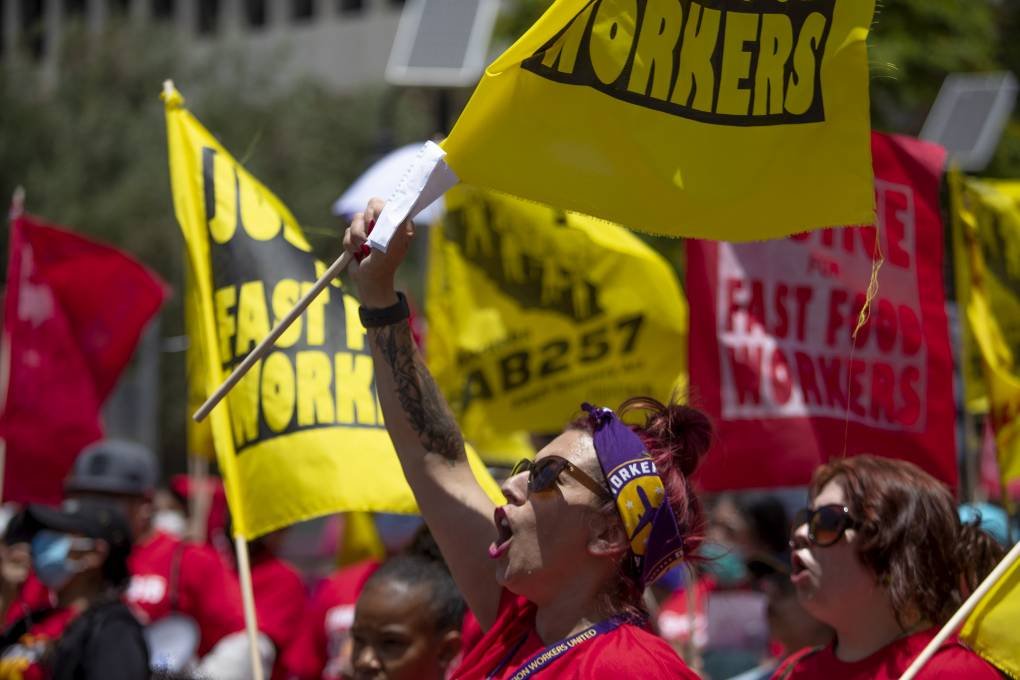 This increase in wages is a result of years of advocacy and protests by fast food workers and labor unions. They have been demanding fair wages and better working conditions, arguing that the current minimum wage is not enough to support themselves and their families. The new law in California is a significant victory for these workers, as it will provide them with a more livable wage.
This increase in wages is a result of years of advocacy and protests by fast food workers and labor unions. They have been demanding fair wages and better working conditions, arguing that the current minimum wage is not enough to support themselves and their families. The new law in California is a significant victory for these workers, as it will provide them with a more livable wage.
The $20 per hour wage is a substantial increase compared to the current minimum wage in California, which is $14 per hour. This means that fast food workers will see a significant boost in their income, allowing them to afford basic necessities without relying on government assistance. It will also provide them with more financial stability and the ability to save for the future.
Moreover, this increase in wages will have a positive impact on the overall economy. When workers earn higher wages, they have more disposable income to spend on goods and services. This increased consumer spending can stimulate economic growth and create more job opportunities in other sectors. Additionally, higher wages can lead to improved employee morale and productivity, which can benefit both the workers and the fast food companies.
However, some critics argue that this wage increase may lead to job losses in the fast food industry. They claim that businesses may not be able to afford the higher wages and may be forced to cut jobs or reduce hours. While this concern is valid, studies have shown that increasing the minimum wage does not necessarily lead to significant job losses. In fact, it can boost employee retention and reduce turnover, which can ultimately benefit businesses in the long run.
Overall, the new law in California to raise the minimum wage for fast food workers to $20 per hour is a positive step towards improving the lives of these workers. It will provide them with better financial stability, alleviate their reliance on government assistance, and stimulate economic growth. This move sets an example for other states and industries to follow, highlighting the importance of fair wages and the well-being of workers in our society.
The Impact of the New Law
The new law will have a significant impact on the lives of fast food workers in California. With the increase in wages, workers will be able to earn a more livable income and support themselves and their families. This will reduce their reliance on public assistance programs and improve their overall financial stability.
Furthermore, the higher wages will also help attract and retain talent in the fast food industry. Many workers in this sector often leave for higher-paying jobs in other industries. By offering a more competitive salary, fast food chains in California will be able to retain skilled workers and reduce turnover rates.
Moreover, the increase in wages will have a ripple effect on the local economy. When workers have more disposable income, they are likely to spend more on goods and services, stimulating economic growth. This can lead to an increase in consumer demand, which may prompt businesses to hire more employees to meet the growing needs of the market.
Additionally, the new law will also have implications for the overall well-being of fast food workers. With higher wages, workers may experience improved job satisfaction and morale, leading to a more positive work environment. This can result in increased productivity and better customer service, ultimately benefiting both the workers and the businesses.
Furthermore, the increase in wages may also have long-term effects on the health and quality of life of fast food workers. With a higher income, workers may have better access to healthcare services, leading to improved physical and mental well-being. They may also have more opportunities to pursue further education or career advancement, opening up doors for personal growth and development.
Overall, the new law not only addresses the issue of low wages in the fast food industry but also has the potential to create a positive domino effect on various aspects of the economy and the well-being of workers. It aims to provide a more equitable and sustainable work environment, ensuring that fast food workers in California can lead fulfilling lives and contribute to the growth and prosperity of the state.
Challenges and Benefits
While the increase in wages is undoubtedly a positive development for fast food workers, it also presents challenges for the industry. Some critics argue that the higher labor costs may lead to job cuts or increased prices for consumers.
However, proponents of the new law argue that the benefits outweigh the challenges. By paying workers a fair wage, fast food chains can improve employee morale and productivity. Happier and more satisfied employees are likely to provide better customer service, leading to increased customer satisfaction and loyalty.
In addition, the higher wages may also have a positive impact on the local economy. Fast food workers who earn a higher income will have more disposable income to spend on goods and services, which can stimulate economic growth in the communities where they live and work.
Furthermore, the increase in wages can also lead to a reduction in turnover rates within the fast food industry. Historically, fast food jobs have been characterized by high turnover rates, with employees frequently leaving for higher-paying positions in other industries. However, with the implementation of higher wages, fast food workers may be more inclined to stay in their positions, leading to a more stable and experienced workforce.
Moreover, the increase in wages can also attract a higher caliber of job applicants. In the past, fast food jobs were often seen as low-skilled and low-paying, which made it difficult for the industry to attract top talent. However, with the promise of higher wages, more skilled individuals may be enticed to join the fast food workforce, bringing with them a greater level of expertise and professionalism.
Additionally, the increase in wages can also improve the public perception of the fast food industry. Fast food chains have often been criticized for their low wages and poor working conditions. By raising wages, these companies can demonstrate their commitment to fair labor practices and social responsibility, which can help improve their reputation and attract more customers.
Overall, while the increase in wages may present some challenges for the fast food industry, the benefits far outweigh the drawbacks. Improved employee morale and productivity, economic growth in local communities, reduced turnover rates, attracting higher caliber job applicants, and enhancing public perception are just a few of the positive outcomes that can result from paying fast food workers a fair wage.
Moreover, the new law in California not only focuses on fair wages, but it also addresses other important aspects of economic equality. For instance, it includes provisions for paid sick leave and scheduling stability, which are crucial for the well-being of fast food workers.
By guaranteeing paid sick leave, the law acknowledges that workers should not have to choose between their health and their income. This provision ensures that employees can take time off when they are ill or need to care for a sick family member without fear of losing their wages or their job. It promotes a healthier workforce and reduces the spread of contagious illnesses in the workplace.
Similarly, the inclusion of scheduling stability is a significant step towards economic equality. Many fast food workers face unpredictable and irregular work schedules, which make it difficult to plan their lives and secure additional employment or education opportunities. The new law requires employers to provide advance notice of schedules and pay additional compensation for last-minute changes. This gives workers more control over their time and enables them to better manage their personal and professional lives.
Furthermore, the law also emphasizes the importance of workplace safety and protection against harassment and discrimination. It mandates that fast food chains provide a safe and inclusive working environment for their employees. This provision not only benefits the workers directly but also contributes to the overall well-being and productivity of the workforce.
Overall, the new law in California is a comprehensive approach to achieving economic equality for fast food workers. It recognizes that fair wages are just one part of the equation and addresses other critical issues such as paid sick leave, scheduling stability, and workplace safety. By implementing these measures, the state is taking a significant step towards creating a more equitable and just society.



































